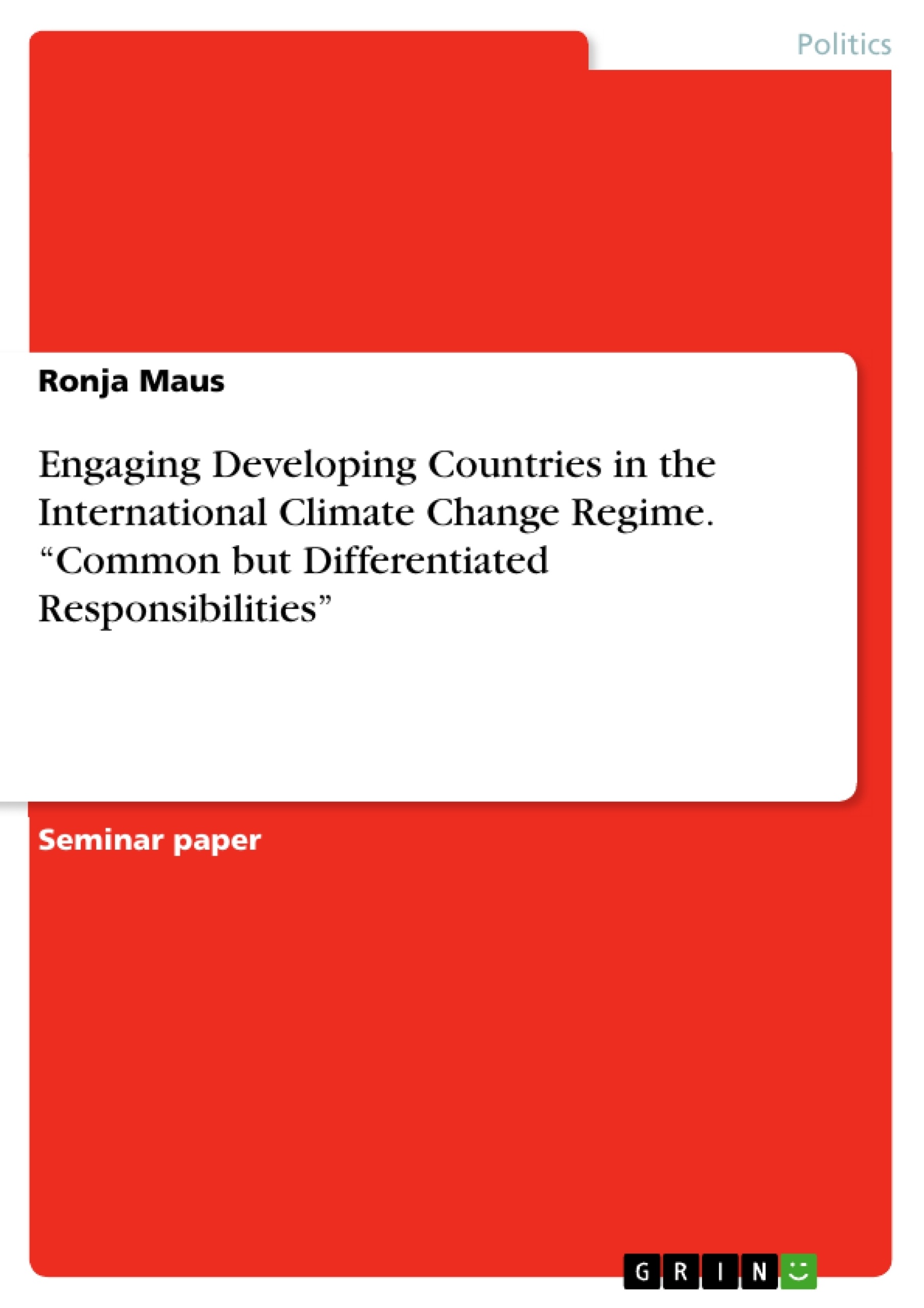One single state is not able to solve the global climate problems. Instead, only an international cooperation comprising as many states as possible can contribute to a protection of a collective good such as a stable climate. This term paper examines the international climate change regime. Keohane & Victor identify this institution as a “regime complex”, which compromises several institutional elements and initiatives such as, for instance, the UN Legal Regime, bilateral initiatives, clubs, experts assessments etc. (Keohane /Victor 2011: 10). In my term paper I will focus on the element of the efforts undertaken by the United Nations. Although nearly universal in membership and probably the most famous, its success is so far rather limited, Keohane & Victor even describing it as “ultimately symbolic” (Keohane / Victor 2011: 10). The reason for its ineffectiveness is that many states still refuse to engage and agree upon binding commitments. The biggest group of these defectors are the developing countries, who will be placed in special focus in this paper.
My key question will be: How should the regime be designed to engage states into the endeavour of climate protection? For soundly answering this question, in a first my selected section of the climate change regime complex – the UN Legal Regime – will be presented. After that the theoretical background will be introduced; the Rationalist Cooperation Theory. Further two game-theoretical models are applied for examining issues of an international cooperation in the field of climate protection. Obstacles and reasons why some states refuse to cooperate can thus be explained. On the basis of the insights from this, this paper focuses on how the regime should be designed to guarantee an implementation of the goals of the climate change regime as well as the compliance of the treaty. How can reluctant states, especially developing countries, be engaged in an international climate change regime?
Inhaltsverzeichnis (Table of Contents)
- Introduction
- Setting the Context: The International Climate Change Regime
- Historical Development of Climate Change Regime
- Legal Framework of Climate Change Regime
- The Position of Developing Countries in Climate Protection
- Theoretical Background
- The Prisoner's Dilemma Transferred on State's Endeavours of Climate Protection
- The Rambo Game Transferred on the Position of Developing Countries within the Climate Change Regime
- Institutional Design & Compliance
- Conclusion
Zielsetzung und Themenschwerpunkte (Objectives and Key Themes)
This term paper examines the international climate change regime, focusing on the UN Legal Regime and its effectiveness in engaging states, especially developing countries, in climate protection efforts. The goal is to analyze how the regime can be designed to guarantee the implementation of its goals and compliance with its treaty.
- The historical development and legal framework of the international climate change regime.
- The role of developing countries in climate protection.
- The application of game-theoretical models to understand obstacles and reasons for state reluctance to cooperate.
- Strategies for engaging developing countries in the international climate change regime.
- Institutional design principles for achieving compliance with climate protection goals.
Zusammenfassung der Kapitel (Chapter Summaries)
- Introduction: The paper introduces the current state of climate change and its consequences, highlighting the need for international cooperation. It focuses on the UN Legal Regime within the broader context of the "regime complex" and emphasizes the challenges of engaging developing countries in climate protection efforts.
- Setting the Context: The International Climate Change Regime: This chapter provides an overview of the historical development of the international climate change regime, tracing its origins from the emergence of scientific concerns about climate change to the establishment of the United Nations Framework Convention on Climate Change (UNFCCC) and the Kyoto Protocol. It also examines the legal framework underpinning these agreements, highlighting their key principles and the categorization of participating states.
- Theoretical Background: This section explores the theoretical underpinnings of international cooperation in climate protection, drawing on rationalist cooperation theory. It applies two game-theoretical models - the Prisoner's Dilemma and the Rambo Game - to analyze the challenges of securing state compliance with climate protection goals, particularly from developing countries.
Schlüsselwörter (Keywords)
The primary focus of this term paper centers on the international climate change regime, examining the challenges of engaging developing countries in climate protection efforts. Key terms include: climate change, regime complex, UN Legal Regime, UNFCCC, Kyoto Protocol, Prisoner's Dilemma, Rambo Game, compliance, institutional design, developing countries.
Frequently Asked Questions
What is the "regime complex" in international climate policy?
It refers to the loose coupling of various institutional elements like the UN Legal Regime, bilateral initiatives, and expert assessments that govern climate protection.
Why do developing countries hesitate to join binding climate commitments?
Developing countries often prioritize economic growth and argue for "common but differentiated responsibilities," citing that developed nations are historically responsible for emissions.
How is the Prisoner's Dilemma applied to climate change?
It explains why states might refuse to cooperate: if one state reduces emissions while others don't, the cooperator bears the costs while others "free-ride" on the benefits.
What is the "Rambo Game" in climate negotiations?
The Rambo Game models a situation where one party (often a powerful or developing state) has little incentive to change its behavior unless the other parties offer significant compensations.
What are the key legal frameworks mentioned?
The paper focuses on the United Nations Framework Convention on Climate Change (UNFCCC) and the Kyoto Protocol.
- Quote paper
- Ronja Maus (Author), 2011, Engaging Developing Countries in the International Climate Change Regime. “Common but Differentiated Responsibilities”, Munich, GRIN Verlag, https://www.grin.com/document/354821



